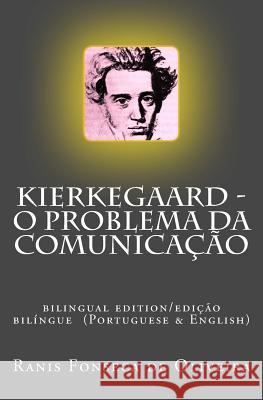Kierkegaard: o problema da comunicacao: Bilingual edition (Portuguese & English) » książka
Kierkegaard: o problema da comunicacao: Bilingual edition (Portuguese & English)
ISBN-13: 9781544022475 / Portugalski / Miękka / 2017 / 100 str.
Como nao se interrogar sobre as razoes filosoficas do questionamento kierkegaardiano: "O que e comunicar?" ou "O que significa dizer? E Como dizer?." "Saber que para reconhecer a verdade, sobretudo a etica e etica-religiosa, e preciso uma situacao, assim como tambem e preciso uma situacao para comunica-las." Sao estas questoes que o leitor encontra nas paginas deste pequeno livro "KIERKEGAARD: o problema da comunicacao." O filosofo de Copenhague propoe em "A Dialetica da comunicacao" uma analise sobre a finalidade da comunicacao. Busca interrogar-se sobre as condicoes do discurso, sobretudo do discurso existencial em um contexto de escandalos, hipocrisias, vaidades e ausencia de interioridade. Esse contexto ele denomina epoca moderna: uma epoca impregnada pelo pensamento do grande filosofo alemao Hegel. Que este livro possa vir a auxiliar aqueles que se interessam por filosofia, sobretudo a filosofia de Kierkegaard (1813-1855), para quem a comunicacao indireta e a via mais adequada para expressar a verdade existencial, isto e, a verdade do Individuo. ______________________________ How does not ask about the reasons for philosophical questioning of Kierkegaard: "What is communicating?" or "What does it mean to say? And as say?." "He knows that to recognize the truth, especially the ethics and ethics-religious, it is necessary to a situation, as you also need a situation to communicate them." These are questions that the player is in the pages of this little book "KIERKEGAARD: the problem of communication." The philosopher of Copenhagen suggests in "The Dialectics of communication" an analysis about the purpose of the communication. Looking to ask themselves about the conditions of the speech, especially speech existential in a context of scandals, hypocrisy, vanities and absence of interiority. This context it refers to the modern era: an era marked by the thought of the great German philosopher Hegel. This book may help those who are interested in philosophy, especially the philosophy of Kierkegaard (1813-1855), for whom the communication indirectly is the most appropriate way to express the existential truth, that is, the truth of the individual.
Zawartość książki może nie spełniać oczekiwań – reklamacje nie obejmują treści, która mogła nie być redakcyjnie ani merytorycznie opracowana.











